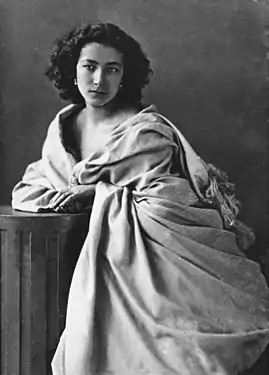English understatement
Understatement is a staple of traditional English culture.[1] It has been exploited to humorous effect, but it is also characterised as part of the English cultural attitude to life.
Etymology
Understatement (litotes) is used at least 94 times in the Old English poem Beowulf, a "high frequency". This "stylistic mannerism" is considered by Frederick Bracher to be inherited from "an earlier, possibly common-Germanic, poetic tradition"; he notes that understatement is also found in mediaeval German poetry and Old Norse poetry. Such understatement may have the effect of mocking irony, humour, emphasis, and the tempering of an (otherwise rather sharp) expression.[2]
Culture

The English attitude was exemplified in the alleged Victorian critique of Cleopatra's behaviour in Sarah Bernhardt's performance of Antony and Cleopatra: "How different, how very different, from the home life of our own dear Queen!"[3]
In April 1951, 650 British fighting men – soldiers and officers from the 1st Battalion, the Gloucestershire Regiment – were deployed on the most important crossing on the Imjin River to block the traditional invasion route to Seoul. The Chinese had sent an entire division – 10,000 men – against the isolated Glosters in a major offensive to take the whole Korean peninsula, and the small force was gradually surrounded and overwhelmed. After two days' fighting, an American, Major General Robert H. Soule, asked the British brigadier, Thomas Brodie: "How are the Glosters doing?" The brigadier, with English understatement, replied: "A bit sticky, things are pretty sticky down there." To American ears, this did not sound desperate, and so he ordered them to stand fast. The surviving Glosters were rescued by a column of tanks; they escaped under fire, sitting on the decks of the tanks.[4]
In November 1963, as The Beatles were becoming a cultural phenomenon in Britain but before they’d become known in the U.S., a photo appeared in the British press showing John Lennon, Paul McCartney, and George Harrison playing Rickenbacker guitars. Rickenbacker’s London distributor, his "urgency cloaked in British understatement," wrote to the company’s California headquarters, “This shows both the Rickenbacker’s (sic) used by the group I mentioned to you. We’ll need samples of both these models, please.”[5]
During the Kuala Lumpur-to-Perth leg of British Airways Flight 9 on 24 June 1982, volcanic ash caused all four engines of the Boeing 747 aircraft to fail. Although pressed for time as the aircraft rapidly lost altitude, Captain Eric Moody still managed to make an announcement to the passengers: "Ladies and Gentlemen, this is your Captain speaking. We have a small problem. All four engines have stopped. We are doing our damnedest to get them going again. I trust you are not in too much distress."[6]
Humour
The stereotype of English understatement has been exploited in humour, for example in Monty Python's The Meaning of Life. In one scene, a suburban dinner party is invaded by Death, who wears a long black cloak and carries a scythe. "Well," says one party guest, "that's cast rather a gloom over the evening, hasn't it?" In another scene, an Army officer has just lost his leg. When asked how he feels, he looks down at his bloody stump and responds, "Stings a bit."[7]
References
- Hübler, Axel (1983). Understatements and Hedges in English. John Benjamins Publishing. ISBN 978-9027225313.
- Bjork, Robert E.; Niles, John D. (1998). A Beowulf Handbook. U of Nebraska Press. pp. 113–114. ISBN 0-8032-6150-0.
- The Oxford Dictionary of Quotations, rev. 4th ed., Anonymous, 14:12, which notes that the quote is "probably apocryphal".
- "The day 650 Glosters faced 10,000 Chinese". The Daily Telegraph. 20 April 2001.
- Port, Ian S. (2019). The Birth of Loud: Leo Fender, Les Paul, and the guitar-pioneering rivalry that shaped rock 'n' roll. Scribner. p. 194. ISBN 9781501141652.
- Job, Macarthur (1994). Air Disaster Volume 2. Aerospace Publications. pp. 96–107. ISBN 1-875671-19-6.
- "Monty Python's Meaning of Life Script Part 1". MontyPython.net. Retrieved 5 June 2015.